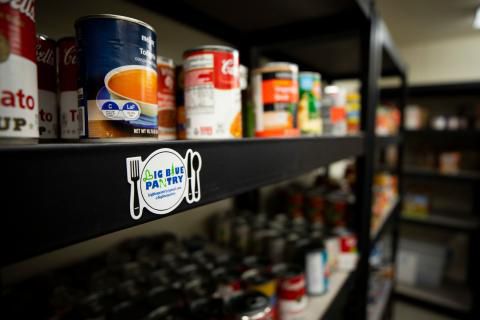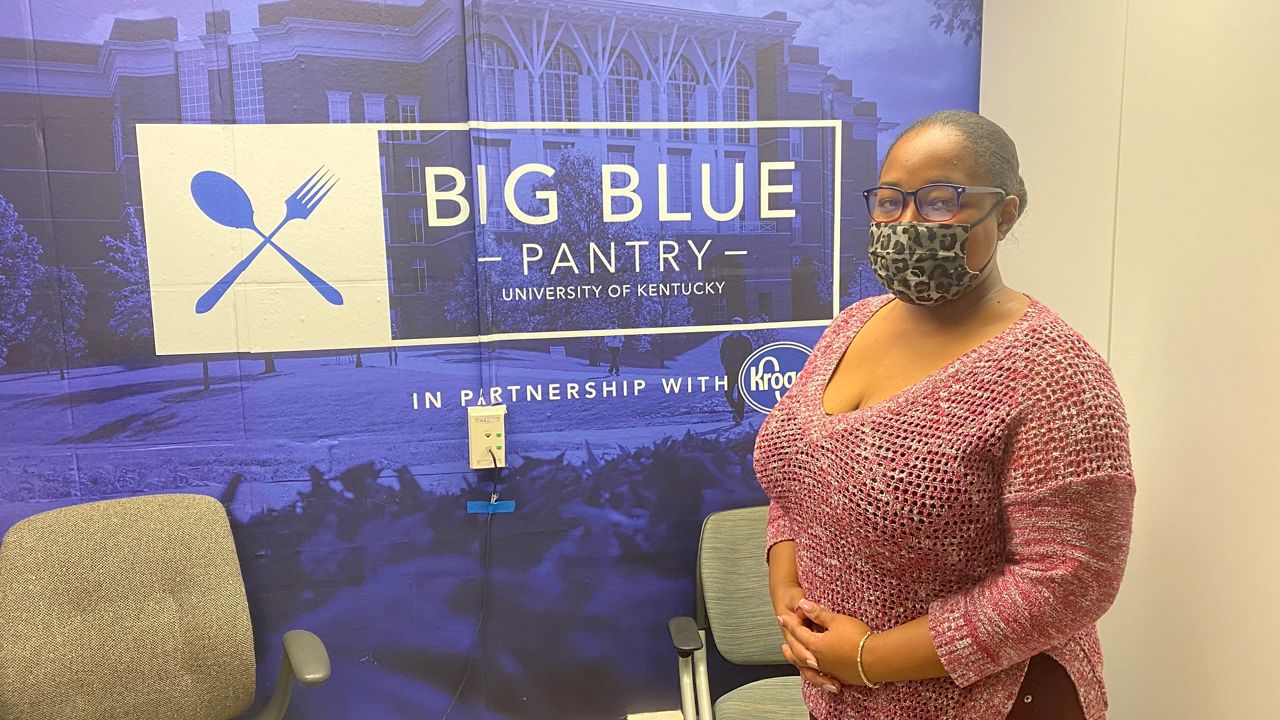LEXINGTON, Ky. – A recent campus study found that more than 40% of University of Kentucky students experience some level of food insecurity during their college career, and the Big Blue Pantry is one resource to help combat the effects.
What You Need To Know
- Study shows 40% of UK students experience some level of food insecurity
- After closing to in-person shopping because of COVID-19, pantry has reopened
- Expanded intake survey has allowed school to work with houseless, hungry students
- Partnerships with Kroger, God's Pantry keeps shelves stocked
Located in the White Hall Classroom Building basement, the Big Blue Pantry is a free, on-campus food pantry open to all enrolled UK students. The Big Blue Pantry has returned to in-person shopping for the 2020-21 school year. Visitors are able to enter the pantry space and shop for themselves. There are no qualifying questions to access the pantry and all that is needed is a valid student ID.
UK Basic Needs Coordinator Arion Jett-Seals, a social worker, said the pantry offered grab-and-go bags this past semester.
“The amount of food we give out has changed a little bit because the numbers of students being on-campus went down during COVID,” Jett-Seals said. “We saw a slight decrease because of that, but one of the other things the university did pretty well was expanded services so students could use meal swipes at most of the places to eat on campus, so students were able to get meals in more places, and we, in the pantry, give out the digital-meal swipes.”
Opened on-campus in 2014, the Big Blue Pantry stocks a wide variety of food products and personal hygiene products and household cleaning supplies. Because donations support the pantry, items on the shelf may change frequently. The Big Blue Pantry works to keep staples (milk, eggs, bread, peanut butter, soups, canned vegetables, canned meat and pasta) on the shelf at all times.
“When someone gets the resources that they need, it empowers them to be able to be self-sufficient and confident,” Jett-Seals said. “A lot of students who are trying to balance schedules, and if they’re a commuter, they may not have a meal plan. A commuter without a meal plan is paying for gas, paying for car insurance and all that, and if you have to have your car, you're going to sacrifice food.”
Jett-Seals said the plan is to ensure no student has a reason to be hungry.

“We have multiple ideas that we've been working on, but for now we have a satellite location near the health colleges because there are some professional students with crazy schedules,” she said. “The numbers do not support the desire, and students use the pantry a lot. We have had a consistent increase in students using our services – coming in and shopping personally as well as using the swipe-ahead program. When I came on, the students wanted to meet with me and see how to expand the services and make its reach a little more effective – the numbers went up by about 200%.”
The Big Blue Pantry has also adjusted when it is open. Instead of being open three days a week, it is now open five days a week with staggered hours.
“We are always doing what we can to try and reach more students,” Jett-Seals said. “That's why we also started doing the meal swipes, because you have the pantry, and it’s great, but it’s only for coming and getting canned goods and to prepare. If your issue is you're hungry right now, the only thing that's going to help you here is a granola bar, or something like that. So what I talked about those students was, OK, let's do a full review of our model.”
Students have to complete a digital-intake survey before visiting the pantry. The purpose of doing so is to get a better idea of how students are struggling. By adding just a few more questions to the survey, Jett-Seals has gotten a much more in-depth look at hunger on campus and the causes behind it.
“I was thinking from a social worker’s perspective,” she said. “Before, the intake survey the students took, asked about food security, how long they have been dealing with it and that kind of thing. I started asking a few more questions, like who else they are responsible for feeding, and if there is a child they are feeding first. Certain questions signal to me there's something bigger than just eating a meal today. From redoing the surveys a year ago, we've been able to work with students who were homeless and get them housing. We've been able to work with students who had children that they were feeding first and get them on SNAP benefits, all from paying attention to their habits in the pantry and the survey responses.”
The Big Blue Pantry partners with Kroger, God’s Pantry and others to provide its inventory. Visit www.uky.edu/concern/big-blue-pantry for more information.



